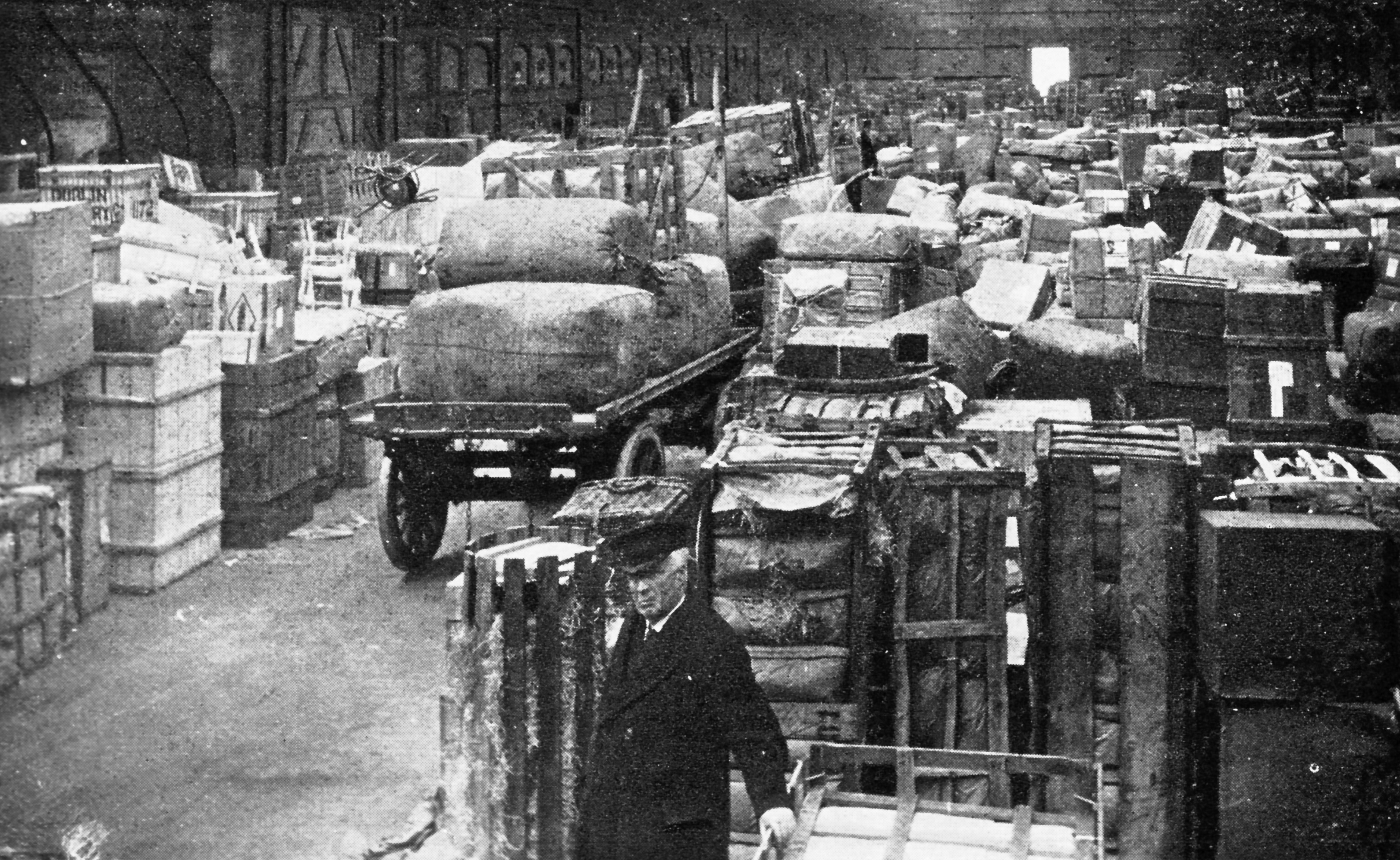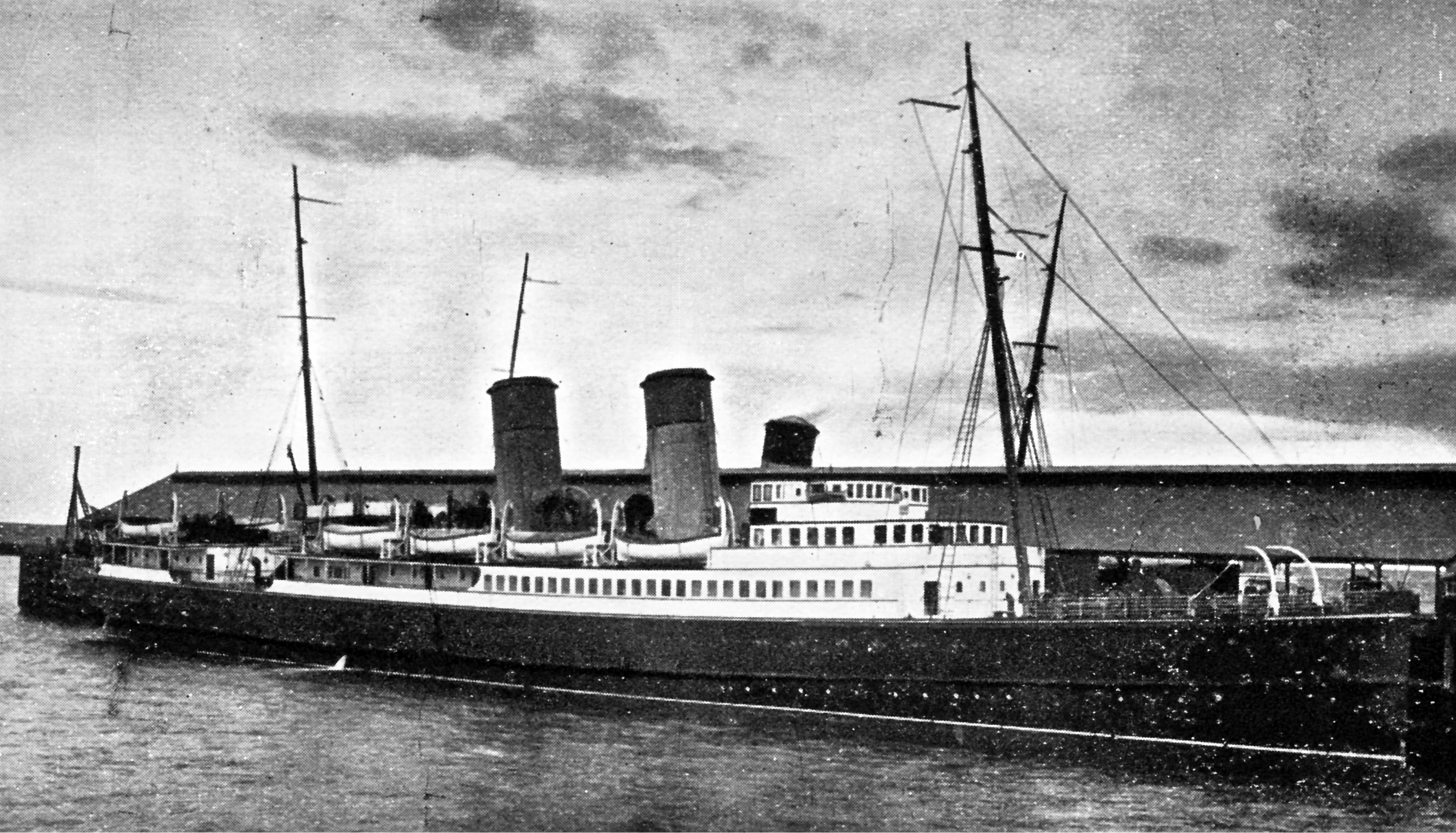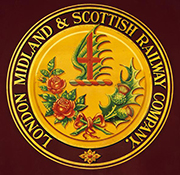

This site uses non-intrusive cookies to enable us to provide a better user experience for our visitors. No personal information is collected or stored from these cookies. The Society's policy is fully explained here. By continuing to use this site you are agreeing to the use of cookies.
[as reported in the May 1932 edition of the “in-house” LMS Magazine.]

RIVERSIDE SHED EXTENSION. NORTH WALL
THE division of the Import work at North Wall into two main sections, free and dutiable, as described last month, entails separate deliveries of town traffic - the one from the Riverside shed and the other from the Customs warehouse. As a result of the extraordinary number of small consignments landed at North Wall, as compared with the more solid tonnage in the outwards direction, no less than 87 per cent of the total traffic carted by the LMS Company in Dublin is "Delivered" traffic.
Before turning away from North Wall for a brief description of some of our other interests in the Irish Free State, some reference should be made to the valuable livestock business which is a daily feature of the export side of the work in Dublin. This, for all practical purposes, may be divided into two main sections: traffic arriving at North Wall from the country by railway and road vehicles, and that coming on foot from the Dublin market, which is held on Thursday in each week and is the largest livestock market in Great Britain or Ireland. The Irish Railway Companies' trains run direct to the- cattle dock, which is capable of holding 40 vehicles in position for unloading direct to the. pens. These pens have accommodation for 782 cattle, or equivalent number of sheep, and there are covered sheds for 1,500 pigs. A new cattle and sheep yard with covered shed accommodation is about to be constructed, adjoining the existing yard, on land at the back of the hotel building, which will bring our facilities for handling livestock at North Wall up to date, and give increased accommodation
All animals undergo two hours detention, or rest period, in accordance with the regulations of the Irish Free State Department of Agriculture, and are fed and watered, after which there is an inspection of each animal by the Department's veterinary officers before embarkation. Before any animal can be loaded on board ship the necessary embarkation licence must be obtained, and, when this is forthcoming, and the animals have been branded, they are duly accounted for on the livestock manifest. Cattle tickets for the throughout journey to destination are prepared at Holyhead.
The cattle yard is in effect a detention yard, any lairaging required in the case or animals outshipped, or held over from one cause or another, being undertaken by fodder agents officially recognised by the Company.

THE CUSTOMS WAREHOUSE AT NORTH WALL
Usually livestock is accommodated on the regular services except on Tuesdays, when during the heavy periods a special boat is required for York market traffic, and on Thursdays when as many as three special boats have sometimes to sail during the autumn and winter months. These additional steamers are requisitioned from the Marine Department, Holyhead, as required. The total amount of cattle traffic conveyed during the year 1931 via Dublin and Holyhead was 112,383; sheep and pigs numbered 233,519. On a busy Thursday in the season we have shipped close on 3,000 animals in five boats in addition to general cargo. It will thus be seen what a valuable business is the livestock traffic from the Irish Free State to Great Britain, and in this connection cattle, etc., passing through Greenore must not be overlooked. The Company has also a number of loose boxes at North Wall for horses crossing to and from Great Britain, and many famous racehorses have travelled through Dublin and Holyhead at one time or another.
It will be appreciated that anyone of the subjects touched upon in these notes could be developed at some length if space permitted, and only a passing reference can be made to the staff, both clerical and wages, numbering about 500, responsible for the efficient discharge of the work at North Wall. A brief account of several other feature of LMS life in the Irish Free State should, however, have a place in this article,
Passenger traffic, with the exception of parcels, perishables, etc., and the few passengers who are conveyed by the cargo boats, is dealt with at Dun Laoghaire, which for a period of 110 years was known as Kingstown, so named after George The Fourth, The boats which carryon the mail service have accommodation for 1412 passengers and are t he fastest cross-channel steamers in the world, having a maximum speed of 25 knots, There are two sailings a day in each direction on weekdays in connection with the well-known Irish mail trains, and a night service on Sundays. The regularity of this service is a household word and is unaffected by any weather conditions which the Irish Sea can produce,
It is of interest to note that the mail service, which had been carried on from Howth for many years, was started from Kingstown (now Dun Laoghaire) in 1828 to and from Liverpool, but a service was also in operation between Howth and Holyhead. In 1848 the Chester and Holyhead Railway Company began a passenger service between Holyhead and Kingstown which continued until 1862, but composite steamers carrying both passengers and cargo sailed to Dublin, North Wall, prior to the latter date and continued until 1922, when the service became a cargo service only. The City of Dublin Steam Packet Company, which was incorporated in 1830, first obtained the mail contract in 1850, and this was continued until 1920, when the service was taken over by the L. & N.·W. Railway Company, and afterwards by the LMS.
The Great Southern Company's trains run in connection with our mail steamers to and from the pier at Dun Laoghaire, and through coaches arc provided to and from Galway, Cork and Belfast for the night services, thus linking up the LMS with the old Midland Great Western and Great Southern and Western systems, and the Great Northern Railway.
The LMS has its own staff and offices at the pier, and is responsible for the transfer of passengers, mails and newspapers to and from the steamers, but the pier itself is the property of the Irish 'Free State Office of Works. Since the introduction of the Customs barrier in 1923 all incoming luggage is subject to examination, and special facilities for the purpose have been provided. This works very smoothly, and passengers to Ireland via Holyhead meet with every consideration.
The passenger traffic is very considerable in the summer months, and at holiday periods. During 1931, for example, the total number of passengers carried was 412,966. There is an increasing tourist and excursion traffic to and from Dublin and the many holiday resorts in Ireland, which is encouraged through the various channels of railway advertising.
Reference has been made to the Eucharistic Congress. It is estimated by the promoters that there will then be a very large number of cross-channel and overseas visitors in Dublin. The cross-channel companies have, therefore, decided that a system of regulation shall be imposed in regard to passengers travelling to and from Ireland during the period of the Congress. This will mean, in effect, that before anyone will be able to board a steamer at Holyhead, for example, during the defined period, an embarkation ticket, which will indicate the date of the journey and steamer, must be held in addition to the travel ticket. For the return journey a similar system will be in force.

INCOMING MAIL BOAT AT DUN LAOGHAIRE PIER
To cope with the heavy passenger traffic a special service of steamers will be put into operation, as many as seven sailings from Holyhead to Dun Laoghaire being provided on certain days. The final day of the Congress is Sunday, June 26th, and the authorities estimate that there may be a million people in Dublin on that day. To facilitate the return from Dublin of one-day passengers the LMS is arranging to sail certain steamers from North Wall on that day, which is an interesting departure from the ordinary arrangements. There will be five steamers sailing from North Wall, or Dun Laoghaire, between the hours of 8 p.m. and 10.30 p.m. on the Sunday night, the ordinary fleet of mail steamers being supplemented by two steamers from the Heysham and Belfast service and one from the Larne and Stranraer route, the latter sailing direct to Larne within a space of roughly three hours. five steamers will arrive at Holyhead conveying 7,000 passengers.
The LMS has an up-to-date booking and inquiry office in Dublin, situated in Westmoreland Street-s-one of the principal streets of the City-and another at Westland Row station, and a new office has just been opened at the pier, within a stone's throw of the Esplanade at Dun Laoghaire.
At Cork, Limerick and 'Waterford, the Company has an agent and resident staff and a booking and general inquiry office, while agents are also stationed in certain other districts in the Free State who act as canvassers in the Company's interests. These agents canvass for business via Dublin and Holyhead , and, in the case of traffic exported from Ireland by other routes, influence traffic to the LMS Company's system in Great Britain. This particularly applies to livestock traffic, of which there is a considerable volume shipped from the numerous ports of the Irish Free State.
Space only permits of a passing reference to the Dundalk, Newry and Greenore Railway, which operates in both the Irish Free State and Northern Ireland, and is entirely financed and controlled by the LMS but worked under Irish railway conditions.
There is a large volume of business, including a considerable livestock traffic, passing through the LMS port of Greenore, situated on Carlingford Lough, between which point and Holyhead a cargo service is maintained three days a week in each direction. The D.N. & G. line is in direct connection with the Great Northern Railway of Ireland at Dundalk and Newry, and is a self-contained railway system of single line construction worked by train staff and ticket. Facilities exist at Greenore - at which place there is "One of the LMS Hotels" and also an 18-hole golf course-for dealing with all classes of traffic.
Why not try Ireland for your holidays this year?
Site contents Copyright © LMS Society, 2026

February 22nd, 2026
Site contents Copyright © LMS Society, 2026